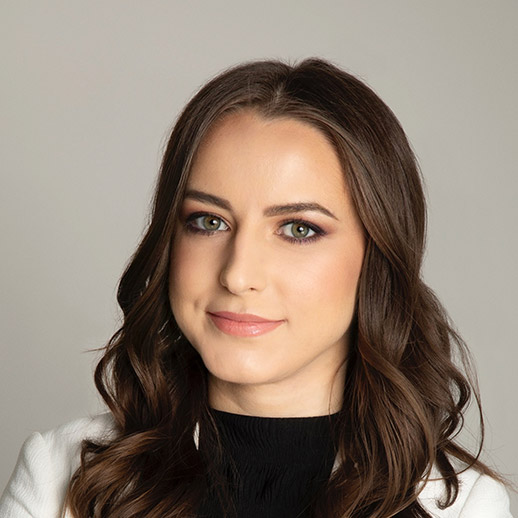Ljiljana Milić is 29 years old and holds a formal education in economics. She graduated from the Faculty of Economics in Belgrade, specializing in Statistics, Informatics, and Quantitative Finance. Additionally, she holds a diploma from Cotrugli Business School with a Master of Business Administration.
She began her career just before completing her undergraduate studies, working as an assistant in the Debt Collection Department at EOS Matrix. The following year, she joined Seminars Serbia, where she was responsible for event organization. She entered the consulting world in 2018 when she had the opportunity to start as a junior consultant at Egzakta Advisory. Over the past four years, she has been involved in significant projects and collaborated with clients such as Telekom Srbija, Frikom, Telenor, and more. Her dedication, solution-oriented approach, and teamwork were quickly recognized by the management of this rapidly growing consulting firm in Southeastern Europe, and she was allowed to progress from consultant to manager and, six months ago, to director.
Introduce yourself. How old are you, and how long have you been in your current position/business?
My name is Ljiljana Milić. I am 29 years old and currently lead the consulting team at Egzakta Advisory. I have been in this sector's director role for the past six months, and I have been involved in consulting for 3.5 years.
What do you believe has set you apart from your generation? What has led you to be professionally distinguished before turning 30?
Our natural tendency to compare ourselves to others often leads people to dream other people's dreams and measure their successes with someone else's yardstick. Competition can only blur our actual goals and individuality. Instead of considering what sets us apart from others, it is more meaningful to consider the values that make us alive and real. Once we understand our natural purpose, we will not need to stand out from others because we will be in symbiosis with ourselves. This will be the right way to give our best in business and life.
They say that happiness is earned. How did you make yours?
Let's imagine happiness as a spring soup; for every soup, the quality and proportion of ingredients are essential. Similarly, one's happiness is cooked—you must have a good balance of crucial aspects of life, creative seasonings, wise choice of collaborators, and time as an indicator of constant progress. The most important thing is to know that there is no recipe for a good soup; it's about the presence of the senses and good collaboration. It's a long process of creation.
Our market is slowly transitioning; the outlines of socialism are still distinctly visible, and mature players hold the cards. What advice do you have for young colleagues on how to break through?
As I write this, billions of pieces of information are being created globally, whether new, processed, incorrect, or otherwise. In such a world, choosing the direction we want to move is crucial. A valuable advice for young colleagues might be to keep their focus on ideas they believe in because, in an information-saturated world, it's the ideas that truly make a difference. They cannot be stolen; if nurtured, they can quickly grow and lead to results. Whether in a corporation or entrepreneurship, the guiding idea doesn't have to be significant, innovative, or revolutionary. Still, the passion that drives you alongside it will inevitably lead to achieving set goals.
Corporation or private entrepreneurship?
There is no definitive, accurate, or correct answer to this question. People must identify which environment suits them better and inspires their personal growth. Success can be equally significant in a corporation and one's venture if passion and dedication are substantial in achieving the goal. Entrepreneurship might demand more sacrifice, energy, and risk, particularly in our years. Still, it's rewarded with an extra dose of motivation that might be less readily available in a corporation. Career success with all the prerequisites and a clear goal will undoubtedly not be deterred solely by the choice between these two career paths.
What specifically led you to develop your career in our country rather than abroad?
My story and answer to this question are pretty simple. People usually start with the attitude of "Let's try somewhere else," but I began with "Let's try here first." Leaving our country is not inherently popular; it's often the result of dissatisfaction with the conditions for growth and development. We are all aware of this when contemplating going abroad. Still, it was necessary to objectively assess whether I could find an environment that suited me and was inspiring in our country before deciding to leave, often resulting in a return after a short period.
In a business sense, how do you see yourself in 10 years?
I avoid attaching my goals to specific timeframes; such an approach can sometimes slow down or postpone progress. My goals are deterministic but not time-bound.
In each period of business development, the focus is on the phase I'm in and the small steps that, when summed up, lead to the next stage. By deducing from that, I expect to become someone who gathers a team around an idea, making each member better and more valuable. I aim to embody the values of mentorship that I experienced or desired during my development.


